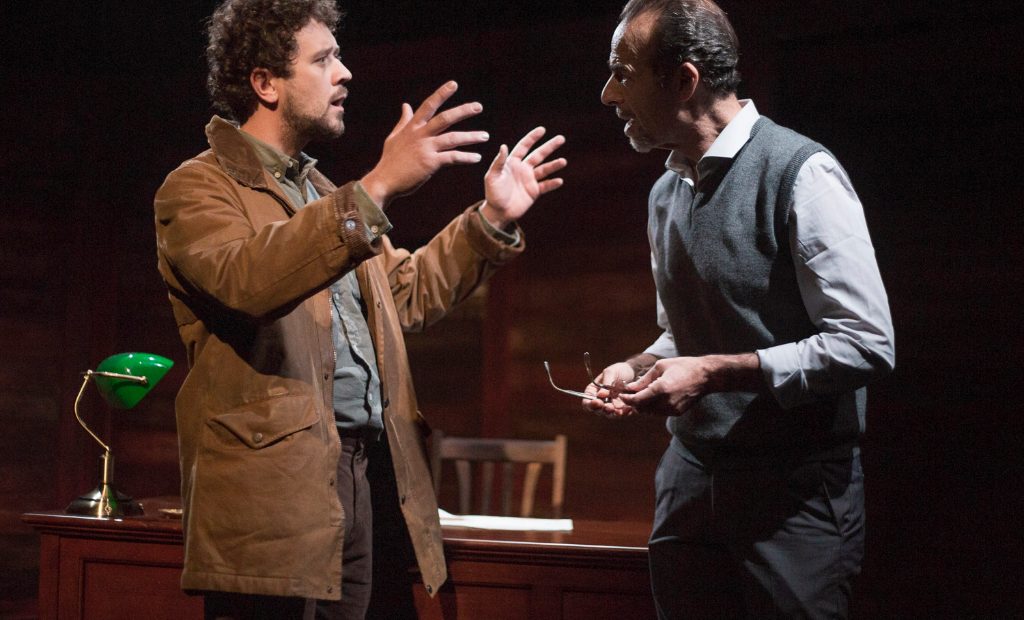Drowned or Saved?: tormented memory of the past
This article was commissioned by The Upcoming, where it appeared for the first time.
When does the researching of explanations becomes an unforgiving hunting of the past? Moving from the the reflections and life of its protagonist, Drowned or Saved?, the new play by Geoffrey Williams, depicts the depth and pain of Primo Levi’s last days.
A survivor of the Auschwitz concentration camp, Levi, a writer and chemist, is intent on finishing his last book, transcribing the stories and his thoughts of his experience in Poland. The call of the suffering characters gives him sleepless nights and he retreats ever further into his gloomy studio. His worried wife, Lucia, and the housekeeper, Mrs Giordanino, are the only sporadic, real human presences in the house. Levi receives, instead, many visits from Elijah and other ever-vivid memories.
The play aims to open to the audience the tormented yet lucid mind of the writer. Despite the sunny days of Turin and the proximity of his loved ones, what happened during the years of the Second World War has left permanent scars that the scientist tries to face and to rationalise through his writing.
The composition of the drama is achieved through few devices, some more successful than others. First of all, the lighting, which plays with shadows and different colourful beams and creates and dismantles the various mental and actual spaces Levi goes to. The music, although present only at certain points, adds a redundant emphasis. The mix of languages used, with English as the main one, alternating from time to time with lines in Italian and German, is a pleasant blending that highlights the warmth of a familiar environment versus the doom of death and tortures from the past, represented by the different speeches.
With the wooden shelves in the background and the calm lighting of the desk lamp in the foreground, the homey setting is filled with the screams and gasping of the prisoners as different events are recollected. These scenes between truth and memory flow one into the other, and out again.
The posed expressions and the soft tone of Marco Gambino perfectly communicate the heavy emotional load of Levi. Alex Marchi, who wears different hats as Elijah, Rabbi, Alex and more, is outstanding. He brings energy to the piece as he swiftly changes into different characters. He is a truly driving force.
The show takes its time to really allow a full immersion into the story, but once it reaches its peak, this emotionally challenging theatre piece awakens our common duty not to forget.
- Read the article on The Upcoming -
Dates: 6-24th November 2018
Venue: Tristan Bates Theatre
 |
| Photo Credit: Ewa Ferdynus |
A survivor of the Auschwitz concentration camp, Levi, a writer and chemist, is intent on finishing his last book, transcribing the stories and his thoughts of his experience in Poland. The call of the suffering characters gives him sleepless nights and he retreats ever further into his gloomy studio. His worried wife, Lucia, and the housekeeper, Mrs Giordanino, are the only sporadic, real human presences in the house. Levi receives, instead, many visits from Elijah and other ever-vivid memories.
The play aims to open to the audience the tormented yet lucid mind of the writer. Despite the sunny days of Turin and the proximity of his loved ones, what happened during the years of the Second World War has left permanent scars that the scientist tries to face and to rationalise through his writing.
 |
| Photo Credit: Ewa Ferdynus |
With the wooden shelves in the background and the calm lighting of the desk lamp in the foreground, the homey setting is filled with the screams and gasping of the prisoners as different events are recollected. These scenes between truth and memory flow one into the other, and out again.
The posed expressions and the soft tone of Marco Gambino perfectly communicate the heavy emotional load of Levi. Alex Marchi, who wears different hats as Elijah, Rabbi, Alex and more, is outstanding. He brings energy to the piece as he swiftly changes into different characters. He is a truly driving force.
The show takes its time to really allow a full immersion into the story, but once it reaches its peak, this emotionally challenging theatre piece awakens our common duty not to forget.
- Read the article on The Upcoming -
Dates: 6-24th November 2018
Venue: Tristan Bates Theatre
Comments
Post a Comment